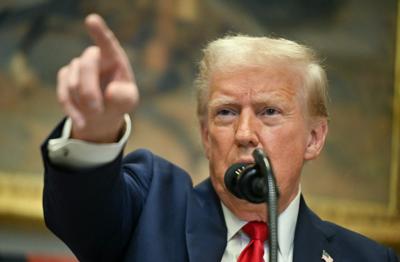More than 40 million Canadians experienced collective whiplash this week.
With trepidation, we awaited Donald TrumpŌĆÖs inauguration and his threatened day-one 25 per cent tariff on imports from Canada.
We heaved a national sigh of relief when his initial executive orders merely instructed U.S. officials to study bilateral trade issues, reporting back by April 1.
Hours later, we were back in the abyss, after Trump casually repeated his 25 per cent tariff pledge, now for Feb. 1.
Is there any method to TrumpŌĆÖs to-and-fro madness? The optimistic view is that heŌĆÖs creating leverage to bargain on other issues: border security, defence spending, our Digital Services Tax (hated by the tech billionaires hogging the front row at inauguration).
The pessimistic view is that Trump has bigger, nefarious ambitions: to go down in history as the first president in 65 years to enlarge America.
Either way, Canada is in big trouble.
Even in the optimistic scenario, and we avoid the tariff through concessions on other issues, weŌĆÖve learned where we stand. More importantly, global businesses have also learned where we stand. The usual sales pitch that Canada offers low-cost guaranteed access to U.S. markets is no longer credible.
Indeed, the flight of business investment following TrumpŌĆÖs threat (even if he doesnŌĆÖt follow through) will likely be the worst consequence of this chaos. And that is probably his main goal: to show companies if they want to sell in America, they need to be in America.
If TrumpŌĆÖs strategy works, he will use it again. The idea of a rules-based trading system (whether in North America, or globally) is out the window. We are back to an era in which brute force rules. And Canada needs to get ready.
Bluntly, Canada once again confronts the fundamental challenge of preserving a viable economic and democratic entity that is more than the northern hinterland of an integrated continental behemoth.
The border is not an ŌĆ£artificial line,ŌĆØ as Trump claims. And it is not just a ŌĆśfrictionŌĆÖ interfering with efficient trade.
understand that borders can foster investment, development, and prosperity in places where they wouldnŌĆÖt have occurred otherwise.
Of course, thatŌĆÖs on top of the even more important dimensions of sovereignty that borders facilitate.
To preserve our viability as a going concern in the face of TrumpŌĆÖs aggression, Canada needs an emergency national response. This should include:
- Emergency aid for export industries while they retool and reorient marketing to both other countries and domestic consumers.
- Expanded access to employment insurance and other supports to help workers survive a disruption that will likely destroy one million direct jobs (and many more spillover impacts).
- Redirect the main thrust of our economic development strategy away from trade, and toward doing things by Canadians for Canadians. ThereŌĆÖs lots to do in that regard. An emergency plan to build affordable housing, infrastructure, renewable energy, and domestically-oriented manufacturing could more than replace the jobs destroyed by Trump.
The content and context for this emergency strategy are both reminiscent of the original National Policy┬Āimplemented by John A. MacdonaldŌĆÖs Conservative government in 1878. That plan included high tariffs on manufactured imports, tariff reductions on imports of raw materials and unfinished goods, and extensive financial and other assistance to develop Canadian industry.
A modern National Policy would likely use different tools (with more focus on innovation, capital investment, and sustainability). But the overarching goal┬ĀŌĆö to develop a diversified, self-reliant national economy with critical mass to exist independently from the U.S.┬ĀŌĆö is identical.
Moreover, the original National Policy followed a failed attempt by Alexander MackenzieŌĆÖs Liberals to negotiate free trade with the U.S. It was fundamentally motivated to resist AmericaŌĆÖs 19th-Century expansion.
Fast forward to 2025, and itŌĆÖs d├®j├Ā vu all over again. Yes, we had a trade deal with the U.S., but it was useless (Trump unabashedly ignores it). And expansionism is clearly on the agenda again: TrumpŌĆÖs inauguration speech pledged to ŌĆ£expand our territory,ŌĆØ days after he proclaimed using ŌĆ£economic forceŌĆØ to absorb Canada.
The threat is existential, the coming debates will be fierce, and the burden of adjustment will be high.
But if we stand up as we did at other defining moments in our history, Canada could emerge as a more independent country than we have recently imagined.






























To join the conversation set a first and last name in your user profile.
Sign in or register for free to join the Conversation